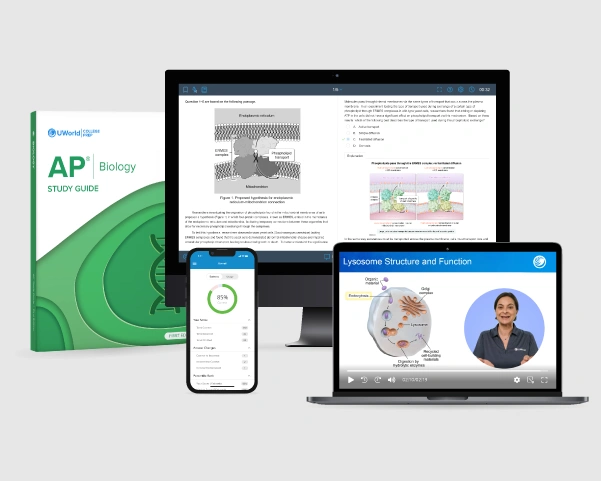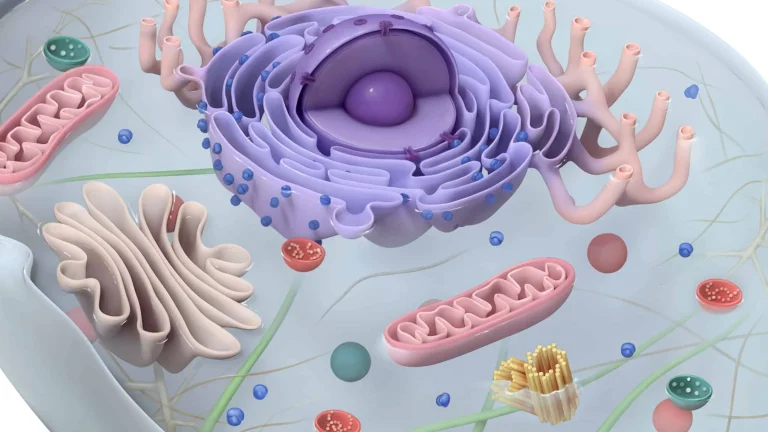The AP Biology exam consists of 2 sections:
- Section I: 60 multiple-choice questions, worth 1 point each, graded by a computer.
- Section II: Four short-answer and two long-answer free-response questions, manually graded by AP Readers. Long-answer questions are worth 8–10 points, while short-answer questions are worth 4 points each.
Each section contributes approximately 50% to your total score. However, since the exact contribution of each section can vary, the total scores are combined and translated into a weighted composite raw score. This composite score is then scaled to a final score between 1 and 5, representing your performance level. You’ll only see this scaled score in your results.
You will not be able to see your weighted combination score on the final results or even the individual score for each section. Instead, you will only receive your AP Biology scores on the 1–5 scale.
AP Biology Scoring Table
As mentioned earlier, your total exam score is translated into a weighted combination and then scaled to a final AP Biology score distribution between 1 and 5. Each score reflects a specific level of performance. Colleges use these scores to determine eligibility for free college credit and placement, with most requiring a score of 3 or higher.
These scores are developed through extensive research conducted by the AP Program to ensure that the AP Biology Exam reflects college-level biology knowledge. Let’s take a look at the score conversion table:
| Final AP Biology Score | College Grade Equivalent |
|---|---|
| 5 | A+ or A |
| 4 | A-, B+, or B |
| 3 | B-, C+, or C |
| 2 | — |
| 1 | — |
As you can see, scores below 3 do not equate to a good college grade. Here’s how each score translates to how well-qualified you might be for placement and free credit.
| AP Biology Exam Score | Qualification |
|---|---|
| 5 | Extremely well qualified |
| 4 | Very well qualified |
| 3 | Qualified |
| 2 | Possibly qualified |
| 1 | No recommendation |
If you score a 4 or 5 on the AP Biology exam, that is considered an excellent score. As shown above, scores between 3 and 5 typically qualify for free credits during college placement. However, check with your prospective colleges for their specific requirements. To maximize your performance, explore our AP Biology Study Guide in print and digital format for expert illustrations and concise notes for every exam unit.

AP Biology Score Distributions
In 2024, 265,000 students took the AP Biology exam, with almost 70% scoring 3 or higher. Below is a comparison of AP Biology score distributions from the last three years:
- Graph View
- Table View
| Final Score | % of Students in 2023 Exam | % of Students in 2022 Exam | % of Students in 2021 Exam |
|---|---|---|---|
| 5 | 14.3% | 15.0% | 7.4% |
| 4 | 23.0% | 23.1% | 19.4% |
| 3 | 27.2% | 29.7% | 32.4% |
| 2 | 23.6% | 21.6% | 30.0% |
| 1 | 12.0% | 10.5% | 10.8% |
With the right preparation and tools, scoring a 5 on the AP Biology exam is achievable. Most students pass, and so can you!
You can try UWorld’s online AP Bio practice tests to help you get better acquainted with the exam format and test your knowledge of the units and concepts you’ve studied. Taking practice tests regularly will help you track your progress. You can also make quick notes to refer back to when you’re reviewing for the exam.
Free-Response Question Scoring Statistics for 2024:
| Question Number | Mean | Total Number of Points |
|---|---|---|
| 1 | 3.09 | 9 |
| 2 | 3.65 | 9 |
| 3 | 2.39 | 4 |
| 4 | 2.16 | 4 |
| 5 | 0.80 | 4 |
| 6 | 1.67 | 4 |
AP Biology Minimum Score Requirement for College Credits
As we mentioned earlier, most colleges require a minimum score of 3 to qualify for free credit and placement. However, you should also know that just taking AP Biology can also make your transcript look good to the college admissions committee, even though it would qualify you for free credits.
If you’re gunning for those free credits, here’s a list of some colleges and their minimum AP Bio score requirements.
| University | AP Biology Score Requirement |
|---|---|
| Harvard, Cambridge, MA | 5 |
| Duke University, Durham, NC | 5 |
| Princeton University, Princeton, NJ | 5 |
| Brown University, Providence, RI | 4 |
| Vanderbilt University, Nashville, TN | 4 |
| University of Texas, Austin, TX | 3 |
| University of Massachusetts, Amherst, MA | 3 |

Frequently Asked Questions
What is a good AP Biology score?
What is the average AP Biology score?
Why are AP Biology scores curved?
How do I get a 5 on the AP Biology exam?
When do the AP Biology scores come out in 2025?
References
- Past AP Biology Score Distributions. (2024). AP Students. Retrieved on December 30, 2024, from https://apstudents.collegeboard.org/about-ap-scores/score-distributions/ap-biology
- 2024 Chief Reader Report - AP Biology. (2024). College Board. Retrieved on December 30, 2024, from https://apcentral.collegeboard.org/media/pdf/ap24-cr-report-biology.pdf
- AP Credit Policy Search. (2024). AP Students. Retrieved on December 30, 2024, from https://apstudents.collegeboard.org/getting-credit-placement/search-policies/course/2
Read More About AP Biology
Understanding the format of the exam gives you an advantage. We've created an easy-to-read guide that breaks down the exam format, types of questions, and more!
AP Biology Course and Exam DescriptionDive into our comprehensive guide to the AP Biology curriculum for detailed insights into the units, topics, and key concepts you will explore throughout the course.
How to Study for the AP Biology ExamA comprehensive guide packed with expert tips and strategies to help you ace the AP Biology using the best course materials, tailored plans, and flexible schedules.
Best AP Biology Prep Course ReviewDiscover the best AP Biology prep courses available. Compare key features, pricings, reviews, and benefits to select the course that best fits your learning.
Best AP Biology Study Guide ComparisonKaplan vs. Barron's vs. Princeton Review vs. UWorld—compare strategies, features, and effectiveness to find the ultimate guide for AP Biology success.
How to Self-Study for AP BiologyLearn effective tips and strategies to self-study for the AP Biology exam. Build confidence, master core concepts, and achieve a high score independently, too.



